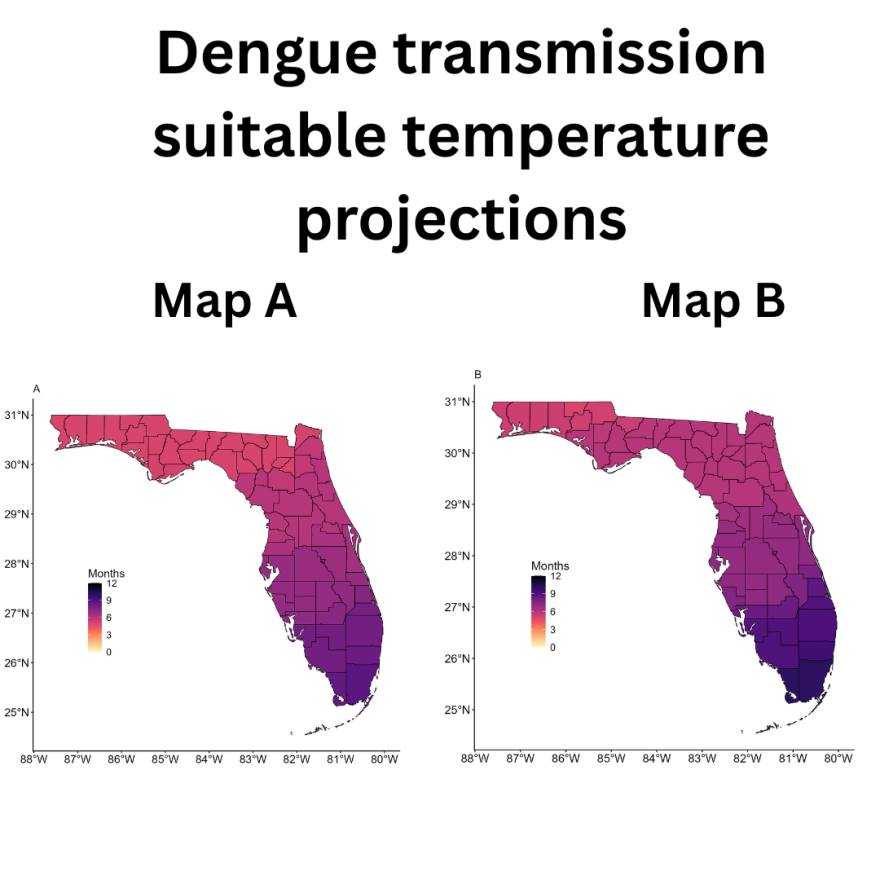Following the weekend’s heavy showers, Brevard County Mosquito Control is working to eliminate possible watery breeding grounds and reduce the chances of any more dengue cases buzzing up.
“I'm hoping at this point that the spike is behind us,” said Joseph Faella, director of Brevard mosquito control. “We're optimistic that it's slowing down, although with this extra water, yeah, we may see a little bit of an influx in water-holding containers.”
In September, Brevard experienced a spike in localized dengue cases, totalling about 27 at the time, and leading the state. As of this week, the county has had 31 cases, making up about two-thirds of the Florida total, according to state data.

The mosquito-borne virus is not known to regularly occur in Florida. However, some cases do emerge yearly in Miami-Dade County, due to the area’s tropical conditions. What’s unusual is any local dengue acquired north of Broward County.
According to the Florida Department of Health’s 16-year online surveillance reports, it’s the first year any Central Florida county has reported local dengue.
Mosquitoes breed in warm temperatures and lay their eggs in water. After storms, it is peak breeding time for mosquitoes.
The skies dropped about 1.5 inches of rain over Titusville between Monday and Tuesday, according to the National Weather Service. Faella said rain affected the whole county, turning ditches and inland flood zones into mosquito breeding grounds. This is why Faella and the control team are working to keep mosquito populations like the dengue carrying mosquito, aedes aegypti, under control.
Recent conditions have made the job harder.
“We have to watch the wind. If we attempt to do a spray when it's too windy, we can lose control of it. It can drift away and not hit the target areas,” Faella said.
Wind makes it hard to target mosquito treatments to specific, smaller areas. According to experts, the Aedes aegypti doesn't have that problem. It's known for the ability to lay 200 eggs in a water container the size of a bottle cap.
“I've seen mosquito larvae in not only bottle caps, but also little potato chip bags. For instance, you just see a little bit of water, and sure enough, there's one or two larvae in there,” Faella said.
Why is dengue in Brevard?
Dr. Sadie Ryan, a medical geography professor at the University of Florida, wants to answer the question: Why Brevard?
“I'm not sure why other nearby counties didn't have dengue with the same suitable habitat. What's special about the Space Coast?” Ryan said.
Dengue thrives in warmer climates. Research shows that climate change is playing a significant role in the spread of dengue, according to the World Health Organization.
Last year, the WHO recorded the most cases of dengue ever observed, with 14.6 million cases reported. About 13 million of those cases were reported in the Americas, the vast majority in Central and South America. Ryan said increased global travel probably also played a part.
Florida’s 2024 dengue travel cases, or cases people picked up from outside the country and brought to Florida, hit a new record with 911 cases – more than quadruple what was expected.
According to the WHO, several factors are considered to be the drivers of more dengue reports, including more rainfall and climate change leading to temperature increases.
That could be one reason for Central Florida’s unusual dengue experience, Ryan said.
“Brevard is suitable for (breeding) a moderate chunk of the year,” she said. “
This year, temperatures got hotter earlier than usual, according to NWS data. And rain came later in the year, allowing for a “perfect combination” for mosquito breeding, Ryan said.
She said Brevard has ideal temperatures between 70 and 93 degrees six months out of the year.

But that appears to be changing.
According to Ryan’s projections for Brevard, the window of suitable breeding time could increase by 2030, allowing for almost eight months of the year to be suitable for Aedes aegypti and possible dengue transmission.
It’s hard to say for sure if Central Florida’s dengue is going to be a blip on the radar or part of a regular trend.
“It could be both,” Ryan said. “We know climate change is creating shifts in seasonality when temperatures are suitable for mosquitoes to survive and to thrive, and to be able to infect people. And in addition to that, we're seeing these increased storms and strange timing for weather.”
Time will tell, she said.
What Brevard residents should know
After the last several days of rain, Faella and the team are working around the county to apply mosquito-larval treatment to water containers that can’t be dumped.
“But it's impossible to reach everywhere, every nook and cranny in the county. So we will see somewhat of an influx,” Faella said.
Brevard County Mosquito Control is asking residents to dump any containers with still water, outdoor kids' toys, shake plants off (like bromeliads), and clearing out clogged gutters.





